PRINCETON, NJ -- Americans remain broadly supportive of labor unions, as they have been over the past seven decades, including a 59% approval rating for unions in Gallup's most recent update from August.
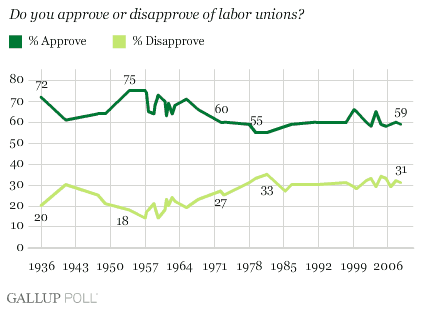
Organized labor unions played an important part in helping Democrat Barack Obama get elected president this year, by providing financial support and manpower for the campaign. Labor leaders now hope that the new administration and Congress will pass legislation favorable to their cause, including steps to make it easier for company workforces to unionize.
Labor unions have also received negative attention lately, with some blaming the financial woes of the Big Three U.S. automotive companies, in part, on generally higher-cost union labor. Leaders of the United Auto Workers have indicated they would be willing to make concessions to the companies to help the Big Three obtain financial assistance from the federal government.
Only about 1 in 10 Americans belong to a labor union, according to Gallup's recent estimates, and about one in six U.S. households include a union member.
While it is not clear to what degree the public's image of labor unions might have changed since the election or in light of the Big Three's financial crisis, Americans have generally held a favorable view of unions for decades -- with no less than 55% of Americans saying they approve of labor unions in Gallup polls conducted from 1936 to 2008.
The public, however, does not have clear preferences as to whether unions should have more, less or the same influence as they have today. The Aug. 7-10 Gallup Poll finds 35% of Americans favoring greater influence for unions in the future, while 32% would rather unions have less influence, and 28% advocate no change in union strength.
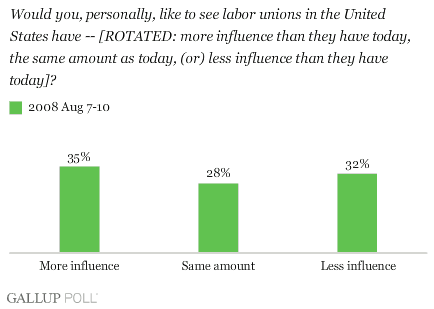
At a broad level, Americans have shown a divide on future union strength since Gallup first asked this question in 1999. However, in the last four years a slightly higher percentage have expressed a preference for increased union influence, with slightly less saying it should stay the same. The percentage that favors decreased union influence has stayed relatively flat over the years.
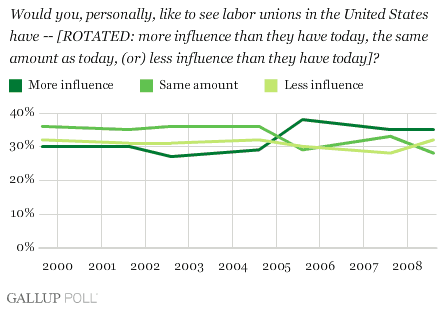
Apart from their preferences, Americans are inclined to expect that unions will become weaker in the future. The poll finds 41% holding this view, while 30% believe union strength will stay the same, and 22% think they will become stronger.
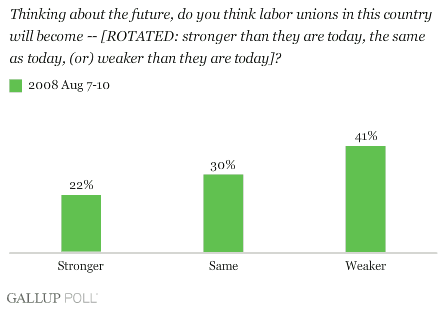
These latest results are generally in line with what Gallup found in prior surveys that asked about future union strength, with a plurality generally believing that unions will weaken over time, and the smallest percentage saying they would grow in strength.
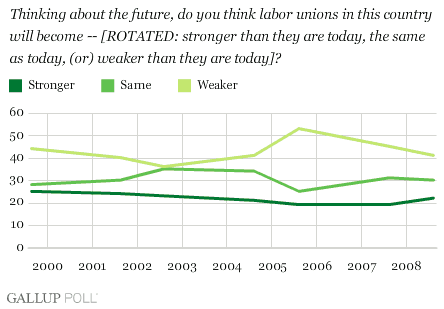
Generally speaking, Democrats are much more supportive of labor unions than independents and in particular Republicans. Seventy-two percent of Democrats approve of labor unions, compared with 63% of independents but only 38% of Republicans. Additionally, Democrats (53%) are three times as likely as Republicans (17%) to want to see labor unions increase their influence in the future.
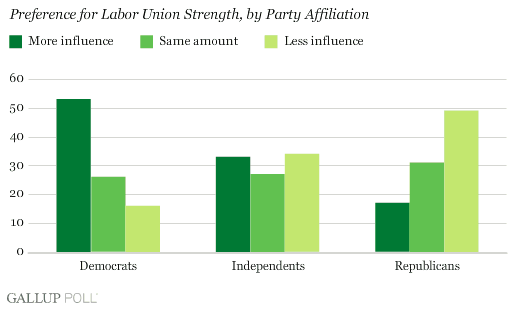
Implications
Americans have been consistently supportive of labor unions at a very general level for at least the past seven decades. Even so, there is not a public consensus to see labor unions increase their influence going forward, and the greatest percentage of Americans seems to see union strength as weakening.
Survey Methods
Results are based on telephone interviews with 1,009 national adults, aged 18 and older, conducted Aug. 7-10, 2008. For results based on the total sample of national adults, one can say with 95% confidence that the maximum margin of sampling error is ±3 percentage points.
Interviews are conducted with respondents on land-line telephones (for respondents with a land-line telephone) and cellular phones (for respondents who are cell-phone only).
In addition to sampling error, question wording and practical difficulties in conducting surveys can introduce error or bias into the findings of public opinion polls.
